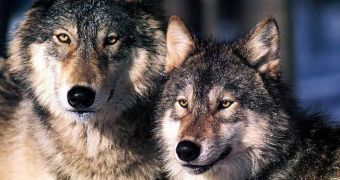On March 27, the Fish and Wildlife Service in the United States announced that it was to conduct an investigation into the life of wolves in Alaska's Alexander Archipelago.
The Service expects that this research project will help it determine whether or not this subspecies of gray wolf is in danger of going extinct, and should therefore be granted protection under the Endangered Species Act. Eco Watch informs that, according to wildlife researchers who have taken the time to study the ways of rare Alaskan wolves, this gray wolf subspecies only inhabits old-growth forests.
Thus, these predators are dependent on large trees inside whose roots systems they establish their dens, and also feed primarily on Sitka black-tailed deer, a species of herbivores that only thrives in said type of forests.
The trouble is that, presently logging activities, including unsustainable ones, are booming both in the Tongass National Forest and in several other areas across the state's southeastern territory.
Should such logging activities cause the state's wolf population to lose a considerable portion of their natural habitat, it will likely only be a matter of time until the overall headcount for this subspecies drops up to the point where little can be done to save these predators from extinction.
Apart from the fact that they risk habitat loss, wolves in Alaska are often killed by hunters. This is chiefly because, as humans establish new logging roads in their habitat, clashes between these predators and people become quite common.
In fact, it was just last year when hunters were given the green light to track down and kill 80% of the wolves in two regions of the Tongass National Forest due to the fact that, in the aftermath of logging operations, few deer remained to inhabit these areas and humans found themselves competing with the wolves in the region.
Once the Fish and Wildlife Service is done carrying out its status review of this subspecies and shares its findings, and after the required public comment period also ends, the agency will announce whether or not wolves in Alaska's Alexander Archipelago are to be granted legal protection under the Endangered Species Act.
Commenting on this initiative, Rebecca Noblin, Alaska director of the Center of Biological Diversity stressed that, “The Alexander Archipelago wolf, one of Alaska’s most fascinating species, needs the protection of the Endangered Species Act if it’s to have any chance at survival.” Furthermore, “The Endangered Species Act is the strongest law in the world for protecting wildlife, and it can save these beautiful wolves from reckless logging and hunting.”

 14 DAY TRIAL //
14 DAY TRIAL //